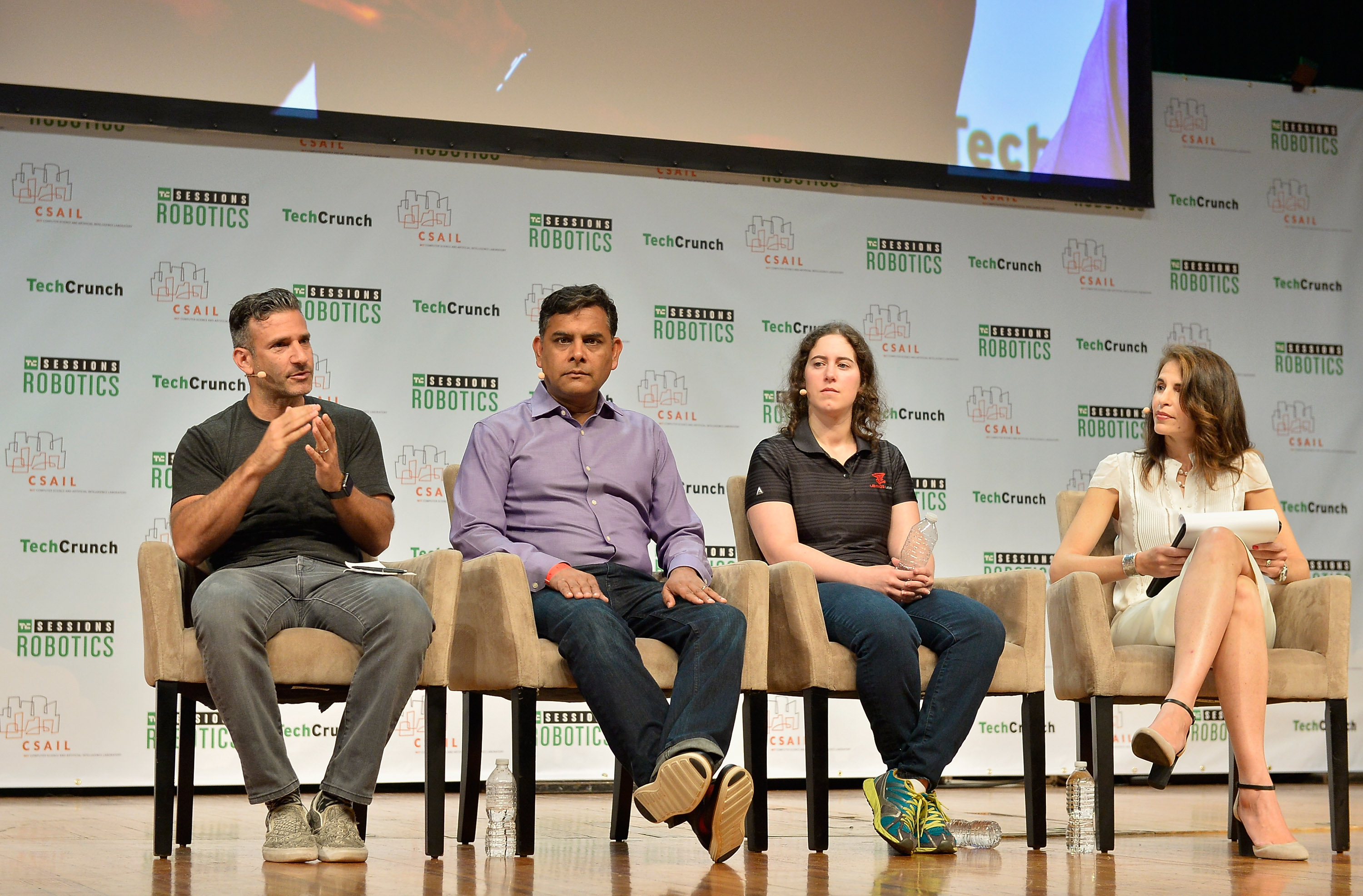Startups
Auto Added by WPeMatico
Auto Added by WPeMatico
While The Inside already offers a range of made-to-order furniture like beds, headboards, chairs and ottomans, it’s aiming for the center of your living room today with the launch of its first sofa collection.
Founded by CEO Christiane Lemieux (who previously founded Dwell Studio and sold it to Wayfair) and COO Britt Bunn (who previously worked at One Kings Lane), The Inside uses technologies like digital printing and 3D modeling to rethink the furniture-buying experience — customers can choose from a variety of furniture models and fabrics, then the company will make the furniture from scratch and deliver it within weeks.
When I met with The Inside’s executive team a few weeks ago, Lemieux repeated the company’s motto of taking customers “beyond the beige,” helping them create a home that isn’t just filled with the same boring furniture as everyone else.
“We want you to love your life,” she said. “When you walk into your house, that should be the ultimate destination.”
Bunn, meanwhile, suggested that the sofa launch represents a culmination of the work the company has been doing to build out its supply chain and develop its technology.
“That’s really the centerpiece of the home, one of the first things you buy when you move into a new apartment,” she said. “We want to take all of the value props we’ve been honing for accent furniture and bring that to the sofa category. Yes, people care about price and speed, but we also want someone to feel excited and inspired to pick from one of our hundred-plus fabrics.”
The collection includes prints created in partnership with Scalamandré, SF Girl by Bay, Refinery29’s Christene Barberich, Homepolish’s Katherine Carter and fashion designers Peter Som and Clare V. The Inside says those designs can be paired with six different frames, ranging from modern sofas (where prices start at $1,600) to slipcover sectionals (prices start at $3,000), all deliverable within four weeks.
Powered by WPeMatico
Indifi, a Gurgaon-based startup that offers loans to small and medium-sized businesses and also operates an online lending marketplace, has raised 1,450 million Indian rupees ($20.4 million) in a new financing round to expand its business in the country.
The Series C round for the four-year-old startup was led by CDC Group, a U.K.-government-owned VC fund. Existing investors Accel, Elevar Equity, Omidyar Networks and Flourish Ventures also participated in the round, the startup announced on Tuesday (Indian Standard Time).
Indifi, which has raised about $34 million in venture capital to date, has also relied on debt to grow and finance loans on its platform. Currently, it’s in about $21 million in debt, Alok Mittal, co-founder and managing director of Indifi, told TechCrunch in an interview.
Indifi, which itself finances some loans, additionally also serves as a marketplace for banks and non-banking financial companies to participate in funding loans to small and medium-sized enterprises, said Mittal. Both the businesses are equally growing and contributing to its bottom line, he said.
A typical loan processed by Indifi is of about $7,000 in size. Overall, the startup offers between $1,400 to $70,000 in capital to businesses.
Unlike banks and many other online lenders, Indifi works with an ecosystem of companies to assess risk factors before granting a loan to a business, Mittal said. For instance, Indifi works with food-delivery startups Zomato and Swiggy and checks a restaurant’s history and feedback from their customers before issuing to a restaurant.
Similarly, if an enterprise from the travel industry were to look for a loan, Indifi checks the volatility of the market. Some of its other business partners include Oyo Rooms, MakeMyTrip, Flipkart, FirstData, Travel Booking and Riya Travel.
“We chose to invest in Indifi because of its advanced data-driven approach that enables it to reach [thousands] of underserved customers across India. By reducing the high cost of risk assessment and customer acquisition, Indifi helps formal and informal businesses to access growth finance that otherwise may not receive it,” Srini Nagarajan, managing director and head of CDC Group’s Asia business, said in a statement.
Despite its longer background check process, Mittal said Indifi has been able to finance nearly 50% of all the applications it gets, compared to about 10% deals that materialize with banks and other lenders.
Indifi, which spent the first year and a half of its existence building relationships with major companies and refining its products, has amassed more than 15,000 customers to date, Mittal said. Its client base has grown by 2.5 times in the past year, he said.
The startup will use the fresh capital to find new clients and lending partners to expand its marketplace business, Mittal said. It will also explore lending to businesses in more sectors, including logistics (so fleet-owners could also get loan).
Indifi competes with a handful of businesses, including Bangalore-based Zest Money, Five Star Finance, Capital Float and, in some capacity, Drip Capital, which recently raised $25 million.
Powered by WPeMatico
Our French startup Digicoop is a remote-first worker cooperative. We started the company in 2015, based on our shared values and passion for technology. The goal was simple: make good products that will have a positive impact on companies. The road to funding, not so simple.
Due to our unique business model, which focuses on building a sustainable company, we had to forego venture capital and convince lots of players to take a chance. The effort paid off. Here’s a look at why we chose to be a co-op, how we got the funding and how it drives our product development.
Unlike many startups, Digicoop wasn’t founded because of a particular product. Our story is a bit different. In 2015, a few friends and former colleagues came together to work on projects they were passionate about. Initially we didn’t know what those would be, but we quickly figured out the theme: collaborative work tools for teams.
Making that our focus was no coincidence. We recognized that the workplace was changing: distributed teams were becoming more common, and with that more transparency and an increased cross-team collaboration necessary. We became frustrated with traditional work tools and processes, as they were no longer enough.
We saw an opportunity to develop products suitable for the digital future, but that wasn’t our only driver. Being passionate about technology and the impact it can have on the society, we set out to build tools that could make a positive difference. The idea was to empower employees, not only managers.
Our shared values and vision of the workplace were the reason we decided to go against the grain and structure Digicoop as a worker cooperative (called SCOP in France), giving each employee a real stake in the company.
Powered by WPeMatico
There’s nothing like having a pair of fresh, unique sneakers. Limited-release culture facilitates some of that, but The Custom Movement hopes to make originality and self-expression via sneakers more accessible to the masses.
The Custom Movement, a custom sneaker startup backed by Y Combinator, enables independent artists to sell their one-of-a-kind sneaker designs to those who want highly unique Nikes, Vans, Timberlands or any other brand of shoe. Customers can shop by shoe brand, style, artist or price.
You can think of it a bit like an Etsy for custom sneakers. Right now, there are about 40 artists featured on the site that offer more than 5,000 different shoes. The platform is entirely open, meaning any artist can sign up to sell their shoes.
That means the prices can vary, but the cheapest shoe you can buy right now costs $110 and the most expensive one costs upwards of $1,000. The Custom Movement processes the payments, but artists handle the shipping.
In exchange for the platform, The Custom Movement takes a 10% commission on the sales price of the shoe. Down the road, the startup wants to help artists more easily manage their inventory and shipping processes. And, in the event something goes wrong with the order, The Custom Movement fully protects buyers.
Growing up in the Philippines, The Custom Movement co-founder Akshar Bonu’s experience of sneaker culture was different from people who grew up in the United States, he told TechCrunch.
“I went to a high school where we had to wear uniforms, so the only real article of clothing we had control over was our shoes,” Bonu said. “It’s my form of self-expression that I had growing up. What was interesting in the Philippines and high school, there wasn’t this monoculture around what people should wear. I’ve always been interested in unique shoes that help me express myself.”

Design by Nate Rivera, one of the artists of The Custom Movement
When Bonu came to the U.S. for college, he was introduced to limited-release culture and “shoes defined by what everyone else wanted,” he said. “That was a huge contrast to my experience with sneakers back in the Philippines. I found the sneaker culture and limited-release culture a bit problematic.”
That’s because, he said, it’s really hard to get the shoes, and then if you get them, there’s some incentive to resell them at a price that is hundreds of dollars higher than what you paid. There are even sites like StockX and GOAT that are entirely dedicated to reselling sneakers.
“The full experience led me to feel like there has to be a place where we can get super-original, creative shoes without breaking the bank,” he said. “I ended up finding them across Instagram with independent artists buying Air Force ones and customizing it. They were drawing on them or changing fabrics. It was amazing. This is where I found this new pool of creativity. Some of the artists resonated with me in a way that a big brand like Nike never could.”
That’s where the idea for The Custom Movement originated. Since joining Y Combinator, the startup has shifted from enabling people to describe what they were looking for to instead having artists put up the designs they were willing to make. All of the shoes are made to order, which enables more artists who don’t have the means to stockpile shoes upfront in order to participate.
“Our youngest artist is 15 years old,” Bonu said. “One thing that keeps us going is we get to enable this generation of sneakerheads who have previously just been spectating in the culture to now participate in it, as opposed to having it all come top-down from Nike. Everything we think about is how do we make it easier for more people to design sneakers and help them grow.”
Prior to Y Combinator, The Custom Movement raised a small amount of funding from Pear Ventures, which has backed startups like DoorDash, Gusto and Branch Metrics. In the near term, The Custom Movement is hoping to help its customers more easily find the designs that resonate with them.
Powered by WPeMatico
We’re just one month away from TC Sessions: Enterprise, which takes place on September 5 at the Yerba Buena Center in San Francisco. But you have only four days left to score an early-bird ticket and save yourself $100. Right now, you pay $249, but once the clock strikes 11:59 p.m. (PT) on August 9, the bird flies south and the price flies north. Get your early-bird ticket today and save.
Focused on the current and future state of enterprise software, this day-long conference offers tremendous value — even at full price. Considering the rate at which this $500 billion industry acquires startups — and how quickly it’s evolving — TC Sessions: Enterprise makes perfect sense for enterprise-minded founders, investors, CTOs, CIOs, engineers and MBA students (student tickets cost $75).
We’ve packed the conference with interviews, panel discussions, Q&As and breakout sessions. TechCrunch editors will dig deep to separate hype from reality as they explore crucial issues, complex technologies and investment trends with both industry giants and up-and-coming startups.
Here’s a sample of just some of what we have planned. You can also check out the agenda — and we might add a few surprises along the way.
Curious about the latest in enterprise investment? TechCrunch editor Connie Loizos will interview VCs Jason Green, founder and general partner at Emergence; Maha Ibrahim, general partner at Canaan Partners; and Rebecca Lynn, co-founder and general partner at Canvas Ventures. They’ll examine trends in early-stage enterprise investments and discuss different sectors and companies that have their attention.
Maybe you want to learn from a founder who’s been there and done that. Don’t miss Aaron Levie, Box co-founder, chairman and CEO, as he outlines what it took to travel the entire startup journey. He’ll also offer his take on the future of data platforms.
Want to cover more ground at TC Sessions: Enterprise? Take advantage of our group discount and bring the whole team. Buy four or more tickets at once and save 20%. Don’t forget: For every ticket you buy to TC Sessions: Enterprise, we’ll register you for a free Expo Only pass to TechCrunch Disrupt SF on October 2-4.
TC Sessions: Enterprise takes place on September 5, but your chance to save $100 ends in just four short days. Don’t wait — buy an early-bird ticket today, and we’ll see you in September!
Is your company interested in sponsoring or exhibiting at TC Sessions: Enterprise? Contact our sponsorship sales team by filling out this form.
Powered by WPeMatico
Impossible Foods is having quite the year.
In the past seven months, the company has signed a nationwide deal with Burger King, weathered a demand surge that saw supplies dwindle and stocks of its signature Impossible burger sell out across the country, and raised fears among players in the $98 billion meat market that they could lose their grip on the American diet.
In October, the principal architect of this impossibly bold assault on the meat market will take the stage at Disrupt SF to talk about it all.
Patrick Brown has been on a wild ride since launching Impossible Foods in 2011. The idea for the company came to Brown, already a famous geneticist, while on sabbatical from his position as a professor of biochemistry at Stanford University School of Medicine.
In his earlier research Brown had already helped define the mechanism by which HIV and other retroviruses incorporate their genes into the cells they infect. At Stanford, Brown and his colleagues developed a new technology that lets researchers monitor the activity of all the genes in a genome and analyze, identify and interpret gene expression.
It was that work with genetics that led Brown to identify Impossible Foods’ key innovation, the development of synthetic heme — a molecule that makes meat… well… meaty.
Driven by the desire to address the environmental impact of animal farming, Brown and Impossible Foods have ambitious plans to develop plant-based alternatives to fish, poultry and beef around the world.
Along the way, Impossible has riled the beef industry, faced down supply chain snafus and made an unlikely ally in Burger King — one of the largest purveyors of beef patties in the U.S.
On our stage in San Francisco, Brown will talk about it all. It’s sure to be a fascinating conversation that will leave our audience with a lot of meaty issues to chew on.
Disrupt SF runs October 2 – October 4 at the Moscone Center in San Francisco. Tickets are available here.
Powered by WPeMatico
A $28 million financing has made SmartNews, an AI-powered news aggregation app, a unicorn.
Japan Post Capital has led the Series E round, which brings the company’s total investment to $116 million and pushes its valuation to $1.1 billion. Existing investors in SmartNews include Development Bank of Japan, SMBC Venture Capital and Japan Co-Invest L.P.
The company, founded in Tokyo in 2012, boasts 20 million monthly active users in the U.S. and Japan. Growing at a rate of 500% per year, its audience checks into the app for a mix of political, sports, global and entertainment news curated for each individual reader. To make money, the company sells inline advertising, video ads and deals with publishers to sell ads against “SmartViews,” its equivalent of Google’s AMP or Facebook’s Instant Articles
SmartNews has nearly 400 U.S. publishing partners including The Associated Press and Bloomberg. It competes with the likes of Apple, which unveiled Apple News + earlier this year, a subscription news product that offers access to more than 300 magazines and newspapers for $9.99 per month.
SmartNews says it will use the infusion of capital to expand its global footprint.
Powered by WPeMatico
We spend a lot of time around here covering the latest startup fundraises, and for good reason. While capital is certainly an input and not an output, there is nothing quite like the closing of a round of several million in venture capital to prove that yes, the startup I’m working on is at least interesting to someone other than me. External validation shouldn’t be your motivating principle, but it is motivating. Plus, it’s a great milestone to reach out to the press and start talking up the story.
And so week after week, we cover the latest rounds. This company raised $4.5 million in a seed round, and this company raised $16 million in a series A. These stories — and the narratives behind them — are crisp, clean, and precise. A proverbial founder walked up and down South Park in SoMa, explained their story, collected a couple of term sheets, picked one, locked in the due diligence, and is now announcing their round. The VCs are excited, the founder(s) are excited, the employees are excited (and sometimes even the customers are excited!)
The reality for founders though is far more messy and gritty than those headlines would indicate. When I get founders off the record and out for drinks, the true story starts to emerge. That $4.5 million seed fundraise took eight months of maniacal scheduling with two hundred investors just to find a lead. And that lead didn’t lead lead, but took only 20% of the round. In the meantime, they raised twelve times across convertible notes and SAFEs, each one giving the company just a bit more gas in the tank to continue.
When I wrote that a startup raised $4.5 million in one slam dunk, what I really should have written was that they raised $150k, $300k, a few more $50k investments from randos, a couple of thousand from that startup competition, wow $500k from that amazing angel, a $750k SBIR grant from the government that took nine months too long to process, some credits from Brex, and finally at some point that lead investor showed up who gets $3-3.5 million in news value credit on their wimpy $900k check.
As an editor and a writer who covers these aggregate rounds, I struggle with how to approach them. Founders regularly tell me that they would love more transparency and less bravado around fundraises. They want to read how other founders handle the messy complexity of their fundraises, if only because they can compare their own hellish experiences with those of others.
More fundamentally, our readers deserve to read the truth. A $4.5 million round led by a single venture firm writing a $3.5 million check is a very different construct than a bricolage of a random assortment of angel investors. That difference in investor and round quality does indicate something about the startup under examination, and so offering more of those details would better inform our readers as well.
All that is well and good, but no one really wants to hear about these difficulties. Certainly users and customers don’t want to hear about how the software they use or purchased is run by a company that is constantly days away from death. Some early-stage employees probably have the focus to ignore such morbid considerations while carrying out their functions, but many need their paychecks to come from a black box. Somehow, the checks always arrive, and that lowers the stress for everyone.
And even just in terms of the craft of writing, do we really want to exchange the standard funding sentence (“blah blah blah raised blah from blah with participation from blah blah blah”) with a multi-paragraph exegesis of a fundraise?
Writing is about choosing which details are salient and which to pass over. It would be exhausting every morning to read tomes of fundraise detail. Yet, our consistency in depicting fundraises as efficient and precise can create an atmosphere where if you didn’t find a lead in a few weeks and lock down the whole round, you are a failure.
That’s not really a depiction I want to support.
And so, take this as someone who talks to dozens of founders a year off the record about their fundraises, and also sat on the other side of the table as a VC for years. Fundraises are almost always really, really, tough. Very few people get commits in the first meeting, or even in the subsequent meetings. Half the investor introductions during a fundraise are often a complete waste of time if not outright damaging, psychologically or materially. There are a lot of sharks out there. It is much more common today to aggregate a bunch of mini-rounds than it was a couple of years ago.
This is not failure, but just the path of the entrepreneur today in 2019. And at the end of that whole long and windy road, after all of those hundreds of hours of coffee meetings and PowerPoint strategy sessions and skeptical investor convos, all of that work will boil down to twenty words about how the fundraise closed, X dollars were raised, and money was seemingly wired magically to your bank account.
You, me, and really everyone can and should know the truth. But perhaps just rejoice in that headline, and get back to the next slog.
Powered by WPeMatico
Hello and welcome back to Startups Weekly, a weekend newsletter that dives into the week’s noteworthy startups and venture capital news. Before I jump into today’s topic, let’s catch up a bit. Last week, I wrote about SoftBank’s second Vision Fund. Before that, I noted some challenges plaguing mental health tech startups.
Remember, you can send me tips, suggestions and feedback to kate.clark@techcrunch.com or on Twitter @KateClarkTweets. If you don’t subscribe to Startups Weekly yet, you can do that here.
This week DoorDash announced an agreement to acquire Caviar, an on-demand delivery business, from Square. DoorDash says it will pay $410 million for the company in a combination of cash and stock. If you’re thinking that seems like a lot of money, you are very much correct.
It’s so much money that all of us over here at TechCrunch were scratching our heads trying to understand why DoorDash would shell out that kind of cash. After all, Square paid only $90 million in stock for Caviar when it acquired the company back in 2014. However, DoorDash is VC cash-rich. The business, still privately-owned, has raised an astronomical sum of venture capital. This year alone it’s raised $1 billion, including a Series G funding of $600 million that valued it at $12.6 billion.
This is fucking insane. pic.twitter.com/tOy4gSM3qo
— Kate Clark (@KateClarkTweets) August 1, 2019
When a company raises that many huge rounds so close together, you can only assume it’s burning through a lot of cash. When it comes time for DoorDash to begin pitching Wall Street for an IPO — we’re thinking late next year — established subsidiaries like Caviar will at least help bolster its IPO-ready narrative.
With monster companies like DoorDash, Grubhub and UberEats owning the food delivery space, we will no doubt see more big M&A deals and more startups die. (Remeber the insane fall of Munchery, anyone?) But will any of these efforts ever become profitable? Or will DoorDash burn through cash until there’s just no more cash left to burn?

If you enjoy this newsletter, be sure to check out TechCrunch’s venture-focused podcast, Equity. In this week’s episode, available here, Equity co-host Alex Wilhelm and I attempt to make sense of DoorDash’s acquisition of Caviar. Equity drops every Friday at 6:00 am PT, so subscribe to us on Apple Podcasts, Overcast and Spotify.




Here’s your weekly reminder that for a low price — a complete bargain really — you can learn more about the startups and venture capital ecosystem with a subscription to Extra Crunch. We offer exclusive deep dives, Q&As, newsletters, resources and recommendations, and fundamental startup how-to guides to our subscribers. Here are some of the best EC posts of the week:
Powered by WPeMatico
Here are five words you’ll never hear spring from the mouth of an early-stage startupper. “I don’t mind paying more.” We feel you, and that’s why we’re letting you know that the price of admission to TC Sessions Enterprise 2019, which takes place on September 5, goes up next week.
Our $249 early-bird ticket price remains in play until 11:59 p.m. (PT) on August 9. Buy your ticket now and save $100.
Now that you’ve scored the best possible price, get ready to experience a full day focused on what’s around the corner for enterprise — the biggest and richest startup category in Silicon Valley. More than 1,000 attendees, including many of the industry’s top founders, CEOs, investors and technologists, will join TechCrunch’s editors onstage for interviews covering all the big enterprise topics — AI, the cloud, Kubernetes, data and security, marketing automation and event quantum computing, to name a few.
This conference features more than 20 sessions on the main stage, plus separate Q&As with the speakers and breakout sessions. Check out the agenda here.
Just to peek at one session, TechCrunch’s Connie Loizos will interview three top VCs — Jason Green (Emergence Capital), Maha Ibrahim (Canaan Partners) and Rebecca Lynn (Canvas Ventures) — in a session entitled Investing with an Eye to the Future. In an ever-changing technological landscape, it’s not easy for VCs to know what’s coming next and how to place their bets. Yet, it’s the job of investors to peer around the corner and find the next big thing, whether that’s in AI, serverless, blockchain, edge computing or other emerging technologies. Our panel will look at the challenges of enterprise investing, what they look for in enterprise startups and how they decide where to put their money.
Want to boost your ROI? Take advantage of our group discount — save 20% when you buy four or more tickets at once. And remember, for every ticket you buy to TC Sessions: Enterprise, we’ll register you for a free Expo Only pass to TechCrunch Disrupt SF on October 2-4.
TC Sessions: Enterprise takes place September 5, but your chance to save $100 ends next week. No one enjoys paying more, so buy an early-bird ticket today, cross it off your to-do list and enjoy your savings.
Is your company interested in sponsoring or exhibiting at TC Sessions: Enterprise 2019? Contact our sponsorship sales team by filling out this form.
Powered by WPeMatico